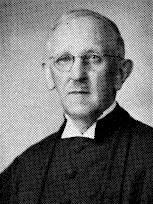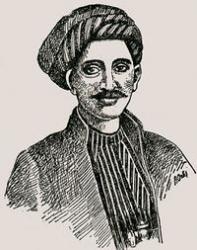Planning worship?
Check out our sister site, ZeteoSearch.org,
for 20+ additional resources related to your search.
- |
User Links
Person Results
Edward Harland
1810 - 1890 Person Name: E. Harland Author of "Jesus, King of Glory" in The Church Hymnal Harland, Edward, M.A., was born at Ashbourne, Derby, 1810, and educated at WadhamCollege, Oxford, where he graduated B.A., 1831; M.A., 1833. On taking Holy Orders he became Curate of Newborough, 1833-36; of Sandon, 1836-51; Vicar of Colwich, Staffordshire, 1851; and Prebendary in Lichfield Cathedral, 1873. In 1858 he published Index Sermonum. His Church Psalter and Hymnal was first published in 1855, and contained 209 hymns and 8 doxologies. In 1863 a Supplement was added: in "186-" [1865] it was revised and enlarged as the "2nd edition,” and in 1876 a Supplement of 184 hymns was added to the 2nd edition, making 584 hymns in all, most of the "Christmas Carols," &c, of the 2nd edition being omitted. To the various editions of this Hymnal, Prebendary Harland contributed the following hymns:—
1. Behold a humble train. (1863.) Presentation of Christ.
2. Beloved disciple! Illustrious name. St. John Evangelist.
3. Breathing slaughter 'gainst thy people. (1863.) Conversion of St. Paul.
4. Heirs of Thy salvation. (1863.) St. Michael and All Angels.
5. Here life is a shadow, and soon will he o'er. (1863.) 0ld and New Year. Written "Oct. 12, 1862, on Wolseley Bridge, with the Trent flowing below." Included in the Hymnal, 1863.
6. Holy men, in olden time. (1863.) Common of Evangelists.
7. In the time of trial. (1863.) For Resignation. An imitation of, and companion hymn to, Montgomery's "In the hour of trial."
8. Jesus calls to us to-day. (1867.) S. School Anniversary.
9. Jesus is the sure foundation. (1S63.) St. Peter.
10. Jesus, King of glory. (1863.) Faithfulness and its Reward.
11. Jesus, these lips can ne'er proclaim. (1863.) Praise to Jesus.
12. Jesus, when Thy cross I see. (1863.) Passiontide.
13. Lord, I never will deny Thee. (1863.) St. Peter.
14. Lord Jesus, when Thou wouldst appear. (1863.) The Annunciation.
15. Lord, Thine ancient people see. (1855 (?).) For the Jews.
16. Lord, we bend before Thy throne. (1867.) Unfavourable Harvest.
17. Lord, when earthly comforts flee. (1855.) Resignation.
18. My Lord, and my God, blessed word that declared. (1863.) St. Thomas.
19. Now, Lord, to every heart make known. (1855.) Passiontide. "This hymn was written at the time of the author's Ordination as Deacon, in 1833. He chose for his first text 1 Cor. i. 23, ‘We preach Christ crucified,' the sermon and the hymn being composed for the same occasion. He has preached from the same text, and this hymn has generally been used on the return of that day, for more than fifty years." It was included in his Hymnal, 1855.
20. O come, all ye faithful, Come, see the place. (1867.) Easter. Pt. i.
21. O come, ye that labour. (1867.) Easter. Pt. ii,
22. O for a humbler walk with God. (1855.) Lent.
23. O Heavenly Jerusalem, Thou city of the Lord. (1863.) Heaven. "This hymn was suggested to the author in a dream. In the night of Oct. 5, 1862, he dreamed that ho saw the choirs of heaven ten thousand times ten thousand, in white robes, marching into a glorious Temple singing this hymn. He awoke, rose from bed, procured a light, and wrote down the words on the back of a letter as he had heard them in his dream, and then retired to rest again. The next morning he found the hymn on his dressing table." It was given in his Supplement, 1863.
24. 0 Thou by Whom the healing art. (1863.) St. Luke.
25. Stephen, first of martyrs, we. (1863.) St. Stephen.
26. The chorus raise of highest praise. (1863.) Praise.
27. This day in this Thy holy place. (1867.) Friendly Societies.
In addition to these the Supplement of 1876 contained his "And now this Holy day," for Sunday. The majority of Prebendary Harland's hymns are for the minor festivals, and are worthy of more attention than they have received. He died June 8, 1890.
-- John Julian, Dictionary of Hymnology
========================
Harland, Edward, p. 491, i. He died at Bishton Hall, Colwich, June 8, 1890.
--John Julian, Dictionary of Hymnology, Appendix, Part II (1907)
Edward Harland
W. Hope Davison
1827 - 1894 Person Name: W. H. Davison Author of "Jesus, King of Glory" in The Church Hymnal Davison, W. Hope, was born at Sunderland, Nov. 27, 1827, and entered the Congregational Ministry in 1S52 as Pastor at Bolton, Lancashire. He published Psalms & Hymns, Bolton, various eds., the last in 1801; The Sabbath Hymnal for use in Schools; and The New Sabbath Hymnal, 1877. Also subsequently two Services of Song for Passiontide. From the latter his hymn "Jesus, King of glory, Throned above the sky" (S. S. Festival), in the Congregational Church Hymnal, 1887, is taken. He died in Aug. 1894.
--John Julian, Dictionary of Hymnology, Appendix, Part II (1907)
W. Hope Davison
Dean Alford
Author of "Forward!—be our watchword" in The Song Companion to the Scriptures See Alford, Henry, 1810-1871
Dean Alford
Albert Sauer
Person Name: A. Sauer Arranger of "[Ist's auch eine Freude]" in Liederlust und Psalter
Albert Sauer
J. C. Aaberg

1877 - 1970 Author of "Rise, O Church Of Jesus" in Hymnal for Church and Home Jens Christian Aaberg (b. Moberg, Denmark, 1877; d. Minneapolis, MN, 1970) immigrated to the United States in 1901. Educated at Grand View College and Seminary in Des Moines, Iowa, he entered the ministry of the Danish Evangelical Lutheran Church in America and served congregations in Marinette, Wisconsin; Dwight, Illinois; and Minneapolis, Minnesota. Aaberg wrote Hymns and Hymnwriters of Denmark (1945), translated at least eighty hymns from Danish into English, and served on four hymnal committees. In 1947 King Frederick of Denmark awarded him the Knight Cross of Denmark.
--Psalter Hymnal Handbook, 1987
J. C. Aaberg
Anna Garlin Spencer
1851 - 1931 Author of "Hail the hero workers of the mighty Past" in Hymns of the United Church Spencer, Anna Garlin (Attleboro, Massachusetts, April 17, 1851--February 12, 1931, New York). Married Rev. William H. Spencer. She was ordained as a Unitarian minister, and was a lecturer and author of books on social problems. In 1896 in her Orders of Service for Public Worship she included her song entitled "The Marching Song of Workers," beginning "Hail the hero workers of the mighty past" set to ST. GERTRUDE. In was included in Hymns of the United Church, 1924, in Songs of Work and Worship, and in Hymns of the Spirit, 1937.
--Henry Wilder Foote, DNAH Archives
Anna Garlin Spencer
William Morley Punshon
1824 - 1881 Person Name: W.M. Punshon Author of "Sweet is the Sunlight" in The New Canadian Hymnal Punshon, William Morley, LL.D. This greatly and justly honoured name of recent Wesleyan Methodism finds a tiny niche in this work from a thin poetic vein, which gave him much enjoyment, if its working out must be confessed to have yielded nothing of permanent value for hymnody, or at all comparable with his splendid service to the Christian Church as preacher and lecturer. His contributions to J. Lyth's Wild Flowers, or, a Selection of Original Poetry (1843), though reprinted in 1846, speedily withered as "flowers" in a hortus siccus. His Lays of Hope (1853) was no advance on the Wild Flowers. His Sabbath Chimes, or, Meditations in Verse for the Sundays of a Year (1867), suggested inevitable comparisons with Keble's classic of the Christian Year. Throughout, the thinking is bewilderingly meagre, the sentiment commonplace, the workmanship clumsy and poor. Ease and inspiration are absent. His Life has been amply and lovingly written by F. W. Macdonald and A. H. Reynar (1887); and it is a noble and beautiful story.
He was born at Doncaster on 29th May, 1824, only child of John Punshon and Elizabeth Morley. The latter was of a good family. He lost his parents in boyhood. Through maternal relationship, young Punshon was introduced to commercial life in Yorkshire, Hull, &c. He marked 29th November, 1838, as the day of his spiritual birth. In 1842 he began to be heard of locally as a preacher, being still in business. In 1844 he proceeded to the Methodist Theological Institute at Richmond; but remained there only a few months. He preferred evangelizing to stated preaching. He leapt into popularity at a bound, probably not to his gain, either intellectually or morally, though his diary breathes an admirable humility. In 1854 he made his advent as a lecturer by his Prophet of Horeb. The impression made by it was amazing. Then followed others, with ever deepening and widening impression. Contemporaneous with his abundant, over-abundant preaching and platform speaking, was such quantity and quality of effective work and service in raising large sums of money for Christian and other missionary and educational work as astounds a reader of his Life. He was five times President of the Canadian Methodist Conference (1868-72), and once of the English Conference (1875). His degree of LL.D. was conferred upon him by the Victoria University, Cobourg, Canada, in 1873. Throughout, in private and public, he was a large-souled, whole-hearted, true man of God. "Weakened by the way" on the continent, he slowly worked his way home, and after a brief final illness, fell gently and softly asleep on April 14, 1881. His hymns in the Wesleyan Hymn Book, 1875, and the Methodist Sunday School Hymn Book, 1879, are :—
1. Listen ! the Master beseecheth. Go, work in the Vineyard.
2. Sweet is the sunlight after rain. Sunday Morning.
3. We woke today with anthems sweet. Sunday Evening.
No. 1 is in the Methodist Sunday School Hymn Book, 1879; and 2 and 3 are from the Sabbath Chime, 1867. [Rev. A. B. Grosart, D.D., LL.D.]
--John Julian, Dictionary of Hymnology (1907)
=========================
Punshon, William Morley. (Doncaster, Yorkshire, May 29, 1824--London, April 14, 1881). Methodist. Except for 6 months at Richmond Theological Institution, he qualified privately for pastorates at Newcastle (1845-1848), Sheffield (1848-1855), Leeds (1855-1858), Bayswater (1858-1861), Islington (1861-1864), and Clifton (1864-1867). His growing fame as preacher, lecturer, and organizer led to his appointment as president of the Canadian Methodist Conference in 1867, to maintain a British tie despite Confederation. Between 1868 and 1873 he travelled all over Canada, besides spearheading the erection of Metropolitan Church. Canadians repaid his leadership and achievements by using for a century three hymns from his Sabbath Chimes (1867). He served as president of the British Methodist Conference (1874-1875), and as Missionary Secretary.
--Hugh D. McKellar, DNAH Archives
William Morley Punshon
Nāşīf Yāzijī

1800 - 1871 Person Name: ناصيف اليازجي Author of "باركي يا نفس للرب الذي" in كتاب الترانيم الروحية للكنائس الإنجيلية Nasif al-Yaziji (March 25, 1800 – February 8, 1871) was a Lebanese author at the times of the Ottoman Empire and father of Ibrahim al-Yaziji. He was one of the leading figures in the Nahda movement. We was a poet, wrote and translated many hymns, and helped in translating the complete Bible into Arabic.
ناصيف بن عبد الله بن جنبلاط بن سعد اليازجي (25 مارس 1800 - 8 فبراير 1871)، أديب وشاعر لبناني ولد في قرية كفر شيما، من قرى الساحل اللبناني في 25 آذار سنة 1800 م في أسرة اليازجي التي نبغ كثير من أفرادها في الفكر والأدب، وأصله من حمص.
لعب دورا كبيرا في إعادة استخدام اللغة الفصحى بين العرب في القرن التاسع عشر، عمل لدى الأسرة الشهابية كاتبا وشارك في أول ترجمة الإنجيل والعهد القديم إلى العربية في العصر الحديث.
Nāşīf Yāzijī
Maria Matilda Penstone
1859 - 1910 Person Name: M. M. Penstone Author of "Lord, to all the workers" in The Church School Hymnal for Youth
Maria Matilda Penstone
Edwin Gilbert
1848 - 1926 Person Name: Edwin Gilbert, 1859- Author of "Together, Lord, we come to Thee" in The Hymnary of the United Church of Canada
Edwin Gilbert


 My Starred Hymns
My Starred Hymns


